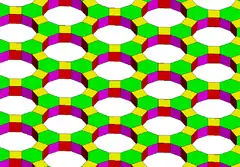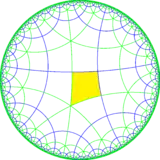Rhombitetrahexagonal tiling
In geometry, the rhombitetrahexagonal tiling is a uniform tiling of the hyperbolic plane. It has Schläfli symbol of rr{6,4}. It can be seen as constructed as a rectified tetrahexagonal tiling, r{6,4}, as well as an expanded order-4 hexagonal tiling or expanded order-6 square tiling.
| Rhombitetrahexagonal tiling | |
|---|---|
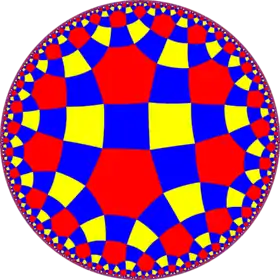 Poincaré disk model of the hyperbolic plane | |
| Type | Hyperbolic uniform tiling |
| Vertex configuration | 4.4.6.4 |
| Schläfli symbol | rr{6,4} or |
| Wythoff symbol | 4 | 6 2 |
| Coxeter diagram | |
| Symmetry group | [6,4], (*642) |
| Dual | Deltoidal tetrahexagonal tiling |
| Properties | Vertex-transitive |
Constructions
There are two uniform constructions of this tiling, one from [6,4] or (*642) symmetry, and secondly removing the mirror middle, [6,1+,4], gives a rectangular fundamental domain [∞,3,∞], (*3222).
| Name | Rhombitetrahexagonal tiling | |
|---|---|---|
| Image |  |
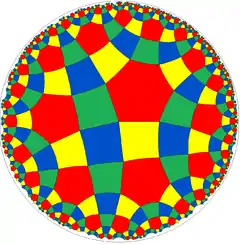 |
| Symmetry | [6,4] (*642) |
[6,1+,4] = [∞,3,∞] (*3222) |
| Schläfli symbol | rr{6,4} | t0,1,2,3{∞,3,∞} |
| Coxeter diagram |
There are 3 lower symmetry forms seen by including edge-colorings: ![]()
![]()
![]()
![]()
![]() sees the hexagons as truncated triangles, with two color edges, with [6,4+] (4*3) symmetry.
sees the hexagons as truncated triangles, with two color edges, with [6,4+] (4*3) symmetry. ![]()
![]()
![]()
![]()
![]() sees the yellow squares as rectangles, with two color edges, with [6+,4] (6*2) symmetry. A final quarter symmetry combines these colorings, with [6+,4+] (32×) symmetry, with 2 and 3 fold gyration points and glide reflections.
sees the yellow squares as rectangles, with two color edges, with [6+,4] (6*2) symmetry. A final quarter symmetry combines these colorings, with [6+,4+] (32×) symmetry, with 2 and 3 fold gyration points and glide reflections.
| Lower symmetry constructions | |||||||||||
|---|---|---|---|---|---|---|---|---|---|---|---|
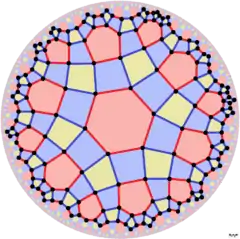 [6,4], (*632) |
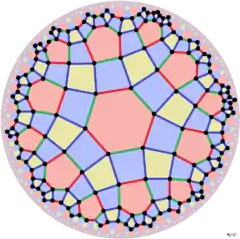 [6,4+], (4*3) | ||||||||||
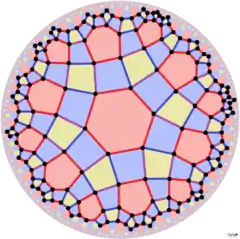 [6+,4], (6*2) |
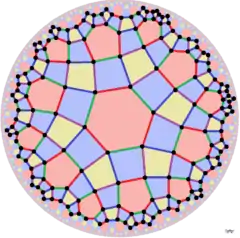 [6+,4+], (32×) | ||||||||||
This four color tiling is related to a semiregular infinite skew polyhedron with the same vertex figure in Euclidean 3-space with a prismatic honeycomb construction of ![]()
![]()
![]()
![]()
![]()
![]()
![]() .
.
Symmetry
The dual tiling, called a deltoidal tetrahexagonal tiling, represents the fundamental domains of the *3222 orbifold, shown here from three different centers. Its fundamental domain is a Lambert quadrilateral, with 3 right angles. This symmetry can be seen from a [6,4], (*642) triangular symmetry with one mirror removed, constructed as [6,1+,4], (*3222). Removing half of the blue mirrors doubles the domain again into *3322 symmetry.
Related polyhedra and tiling
| *n42 symmetry mutation of expanded tilings: n.4.4.4 | |||||||||||
|---|---|---|---|---|---|---|---|---|---|---|---|
| Symmetry [n,4], (*n42) |
Spherical | Euclidean | Compact hyperbolic | Paracomp. | |||||||
| *342 [3,4] |
*442 [4,4] |
*542 [5,4] |
*642 [6,4] |
*742 [7,4] |
*842 [8,4] |
*∞42 [∞,4] | |||||
| Expanded figures |
 |
 |
 |
 |
 |
 |
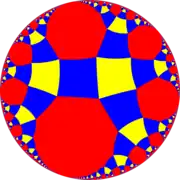 | ||||
| Config. | 3.4.4.4 | 4.4.4.4 | 5.4.4.4 | 6.4.4.4 | 7.4.4.4 | 8.4.4.4 | ∞.4.4.4 | ||||
| Rhombic figures config. |
 V3.4.4.4 |
 V4.4.4.4 |
 V5.4.4.4 |
 V6.4.4.4 |
 V7.4.4.4 |
 V8.4.4.4 |
 V∞.4.4.4 | ||||
| Uniform tetrahexagonal tilings | |||||||||||
|---|---|---|---|---|---|---|---|---|---|---|---|
| Symmetry: [6,4], (*642) (with [6,6] (*662), [(4,3,3)] (*443) , [∞,3,∞] (*3222) index 2 subsymmetries) (And [(∞,3,∞,3)] (*3232) index 4 subsymmetry) | |||||||||||
= = = |
= |
= = = |
= |
= = = |
= |
||||||
 |
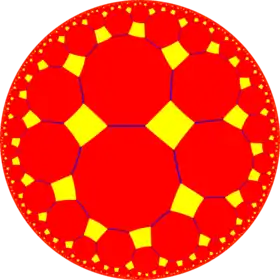 |
 |
 |
 |
 |
 | |||||
| {6,4} | t{6,4} | r{6,4} | t{4,6} | {4,6} | rr{6,4} | tr{6,4} | |||||
| Uniform duals | |||||||||||
 |
 |
 |
 |
 |
 |
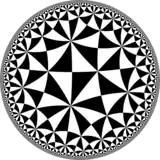 | |||||
| V64 | V4.12.12 | V(4.6)2 | V6.8.8 | V46 | V4.4.4.6 | V4.8.12 | |||||
| Alternations | |||||||||||
| [1+,6,4] (*443) |
[6+,4] (6*2) |
[6,1+,4] (*3222) |
[6,4+] (4*3) |
[6,4,1+] (*662) |
[(6,4,2+)] (2*32) |
[6,4]+ (642) | |||||
= |
= |
= |
= |
= |
= |
||||||
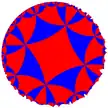 |
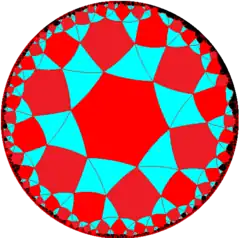 |
 |
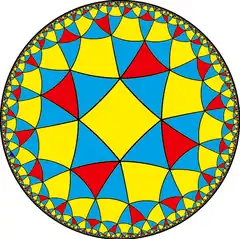 |
 |
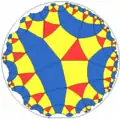 |
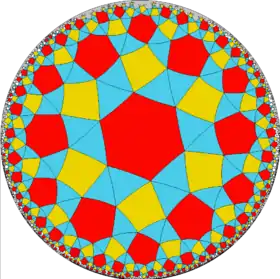 | |||||
| h{6,4} | s{6,4} | hr{6,4} | s{4,6} | h{4,6} | hrr{6,4} | sr{6,4} | |||||
| Uniform tilings in symmetry *3222 | ||||
|---|---|---|---|---|
 |
.png.webp) |
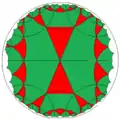 |
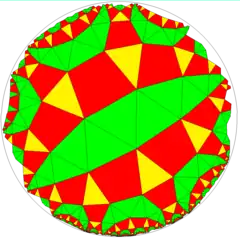 | |
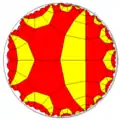 |
 |
.png.webp) | ||
 |
 |
 | ||
See also
References
- John H. Conway, Heidi Burgiel, Chaim Goodman-Strass, The Symmetries of Things 2008, ISBN 978-1-56881-220-5 (Chapter 19, The Hyperbolic Archimedean Tessellations)
- "Chapter 10: Regular honeycombs in hyperbolic space". The Beauty of Geometry: Twelve Essays. Dover Publications. 1999. ISBN 0-486-40919-8. LCCN 99035678.
